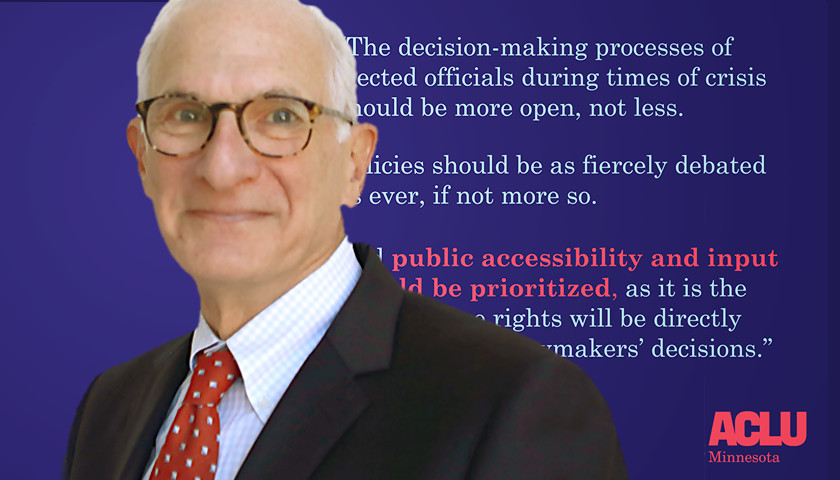A legal organization said members of the Minnesota Legislature are holding committee meetings in small groups in order to avoid triggering the state’s “Open Meeting Law.”
The American Civil Liberties Union (ACLU) of Minnesota said legislators have been deliberately meeting in small groups so they can bypass the law, which generally requires that all meetings be open to the public.
Additionally, the ACLU claimed that the dates for “most of these” committee meetings were not disclosed until after they had already occurred, while bill language for the COVID-19 response legislation was not posted until right before floor sessions started.
“While the ACLU of Minnesota appreciates that we are in the midst of a health crisis that creates unique difficulties for communication, the very nature of the COVID-19 outbreak makes it all the more essential that our Legislature debate policy and make decisions within the public eye, with public oversight,” ACLU of Minnesota Executive Director John Gordon said in a press release (pictured above).
“Policy agreements are being made behind closed doors without even the semblance of a public committee hearing. Government cannot and should not function in secrecy,” he added.
Gordon then claimed in an op-ed for The Star Tribune that the Legislature’s first coronavirus response bill “was already agreed to by all four legislative leaders before it was even released to the public.”
“Furthermore, it remains unclear how much influence leadership and the working groups still have over bill proposals. What is clear is that, at least until April 14, only proposals already agreed to by all leadership made it to a full floor vote. And implied, of course, was that the proposals would be passed without major opposition. Which they were. At times, it was not merely implied, but plainly stated,” he continued.
The Open Meeting Law applies only when a quorum (majority) or more of the members of the governing body in question are gathered. However, deliberately holding meetings in groups of less than a quorum in order to “avoid open meeting law requirements” can be considered a violation.
“Serial communication through telephone conversations or letters by less than a quorum with the intent to avoid a public hearing or to come to an agreement on an issue relating to official business could also violate the law,” a summary of the law from the House Research Department states.
The law allows for conducting meetings by telephone or other electronic means “if a health pandemic or other emergency makes meeting in person impractical or imprudent.”
“The public body must give notice of the regular meeting location, of the fact that some members may participate by telephone or other electronic means, and of the right of the public to monitor the meeting from another location. In addition, the public body must post the notice on its website at least ten days before any regular meeting,” the law says of meetings during a pandemic.
Gordon said this “type of closed-door negotiation is not new,” but should not be “considered normal.”
“Legislative leadership has resorted to this type of secretive decisionmaking before, in non-emergencies. This is frustrating at the best of times, as everyone from rank-and-file legislators to advocates to the general public is left out of the process,” he concluded. “No one knows what statements are being made, what agreements are being struck and what the underlying reasoning is.”
– – –
Anthony Gockowski is managing editor of The Minnesota Sun and The Ohio Star. Follow Anthony on Twitter. Email tips to [email protected].
Photo “John Gordon” by ACLU Minnesota.




